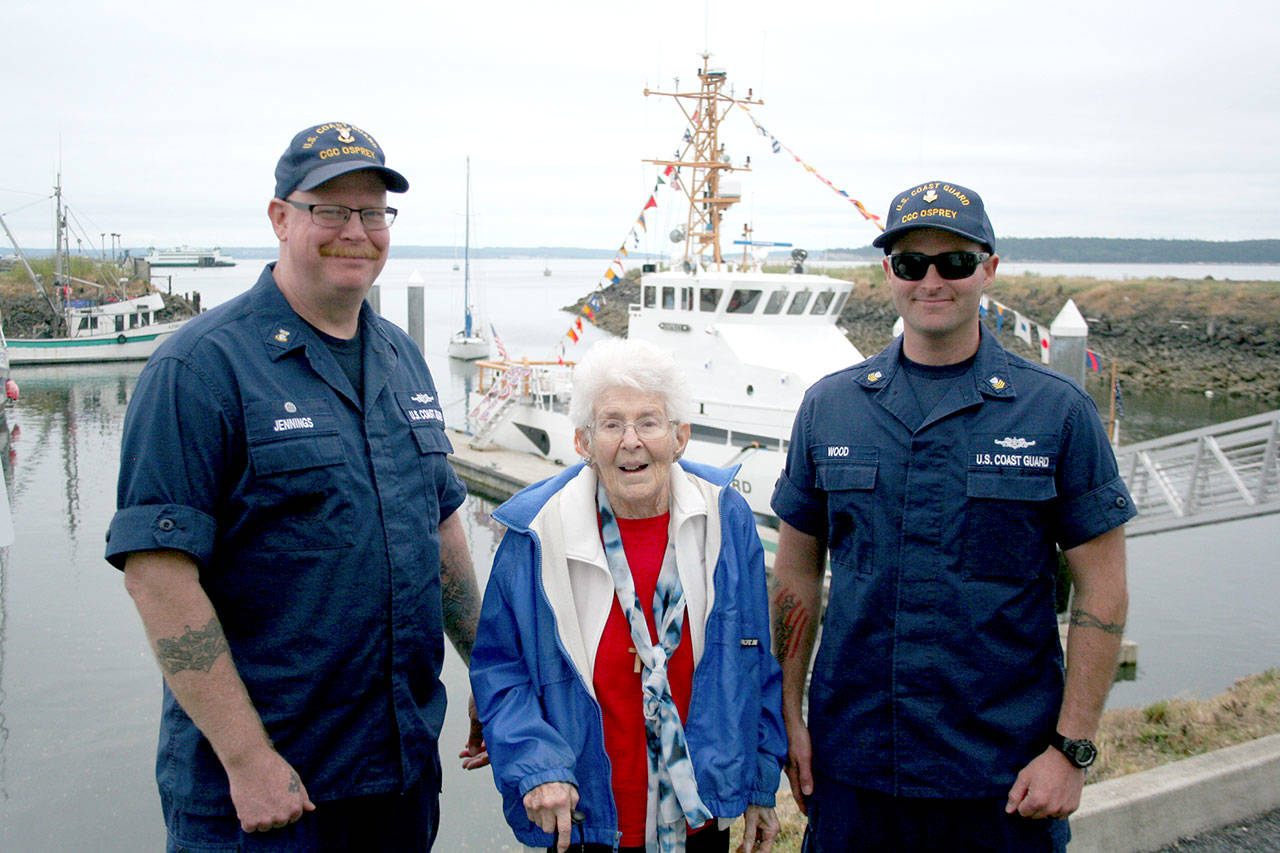PORT TOWNSEND — During World War II, Marjorie Ehnebuske wasn’t allowed overseas. The U.S. Coast Guard Yeoman 1st Class couldn’t be on a ship, either.
“I never found out if it was bad luck for the people on board or for the women,” she joked from the comfort of her apartment at Avamere, a retirement community in Port Townsend.
Ehnebuske, 97, got a chance Thursday to visit the cutter Osprey as the Coast Guard hosted an open house on the Fourth of July.
Master Chief Officer in Charge Mike Jennings plans to arrange a private tour of the ship when the crew can accommodate Ehnebuske and her family.
About 1,500 people visited the cutter Thursday with an opportunity to learn more about the Coast Guard, the Osprey and to eat barbecued hamburgers and hot dogs.
Dressed in a long-sleeved red shirt with a white fleece vest and a blue scarf, Ehnebuske (pronounced ENNA-bus-key) was honored when Jennings shook her hand and presented the Osprey’s recognition coin.
“I got to be among the front runners of the idea to let people be who they are, and give them the job they’re supposed to do,” Jennings said about today’s mixed-gender crews.
That wasn’t always the case.
It’s been more than 70 years since Ehnebuske enlisted in the Coast Guard Women’s Reserve, a branch established by Congress and signed into law by President Franklin Delano Roosevelt in November 1942.
Ehnebuske signed up on Armistice Day the following year and left her hometown of Roselle Park, N.J., to ride a train overnight down the coast to Palm Beach, Fla.
“It was the first time they allowed women to do anything except stay home, keep the house and mind the children,” she said.
That wasn’t just military structure. It was the way of life, Ehnebuske said.
After she graduated high school and got a job as a typist for an insurance company on Wall Street in New York City, Ehnebuske wanted an opportunity to serve her country.
She was 23 when she enlisted in 1943. She wasn’t allowed to be married or have any children.
Ehnebuske considered the Army, but she couldn’t see herself wearing the uniform.
“It was heavy wool and khaki-colored,” she said. “In those days, we dressed up a lot before World War II.”
The Coast Guard provided the type of attire she was looking for along with a chance to be a SPAR — a name fashioned from the first letters of the Coast Guard motto, Semper Paratus, and the first letters of the English translation, Always Ready.
That, and “the Coast Guard saved people. They didn’t kill them,” Ehnebuske said.
She went through basic training without weapons qualifications and was assigned the job of yeoman, which took advantage of her typing and record-keeping skills. Eventually, she became an instructor for new recruits who were assigned to the yeoman school.
It was a different world in Florida, where the military had taken over many homes and hotels in the area for housing, Ehnebuske said. The Army had a camp about 30 miles south in Boca Raton.
When they got a chance to socialize, they often looked for people from near their hometowns. That’s when she met Lars Ehnebuske, who served in the Army and was helping to develop radar technology.
Lars came from a town in New Jersey about 11 miles away from Roselle Park, Marjorie said.
While they were stationed at their respective posts, the only way the two could communicate was through telegram.
“He had asked me if I would meet him in Palm Beach when he had a day off,” Marjorie said. “I sent him a telegram that said, ‘Semper Paratus.’
“He couldn’t remember what ‘Semper Paratus’ meant. He thought it was the Boy Scouts motto. That was quite a shock.”
They had their first date on Christmas Eve and eventually married in 1946, a few months after Marjorie was discharged.
Lars was a first-generation Swede who had been attending Rutgers University in New Jersey when he was drafted. Once he was discharged, one of his former Rutgers professors recommended the electrical engineering program at the University of Colorado in Boulder.
The Ehnebuskes drove a Studebaker across the country for Lars to finish his degree.
Marjorie got a job in Boulder but realized she could do more.
“One day I thought, ‘What am I doing? I could go to school on the G.I. Bill, too,’” she said.
While Lars finished school, Marjorie wasn’t able to do so. She had to take basic courses, including remedial math, “in order to measure the sheets and all,” she joked.
Lars got a job with IBM and moved his family several times through seven different states, “every time he got a promotion,” Marjorie said.
They had three children, Dave, 70, Suellen, 67, and Don, 65. The brothers now live in Port Townsend.
Lars died of cancer in 1987 when the Ehnebuskes lived in Dallas. Marjorie lived there by herself for a while before she moved in with her daughter in Berkeley, Calif.
Now on the North Olympic Peninsula for the past three years, Marjorie looks back and smiles at the milestones in her life.
Gender roles and expectations are much different. Travel and communication is much faster. Women can enlist more freely into the military.
What never changed is the way she felt about her service.
“I was proud to do that,” she said.
________
Jefferson County Managing Editor Brian McLean can be reached at 360-385-2335, ext. 6, or at bmclean@peninsuladailynews.com.

